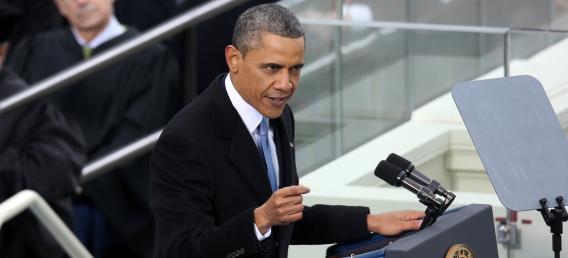President Obama had the public swearing-in for his second term as president on Monday, and he used the opportunity to outline a broad agenda that included several goals that liberals had been waiting for four years to hear from the president. Inaugural addresses are often criticized for being too broad, more about the rhetoric than the content. This wasn’t quite the case now, points out the New York Times’ Adam Nagourney, noting Obama made several points that could be important over the next few months. Among other things, he surprised many by making a forceful case for action on climate change and also made a vigorous defense of entitlement programs. (Read a transcript of the speech here, or watch it after the jump.)
“We will respond to the threat of climate change, knowing that the failure to do so would betray our children and future generations,” Obama said. “Some may still deny the overwhelming judgment of science, but none can avoid the devastating impact of raging fires, and crippling drought, and more powerful storms. The path towards sustainable energy sources will be long and sometimes difficult. But American cannot resist this transition. We must lead it.”
In his second inaugural address, “President Obama became the progressive leader that many liberals thought they were getting when they voted him into office four years ago,” writes the Washington Post’s Chris Cillizza. He not only outlined progressive principles, he also issued a thinly veiled criticism against ideologues who many have blamed for paralyzing Washington: “We cannot mistake absolutism for principle, or substitute spectacle for politics, or treat name-calling as reasoned debate.”
Yet Obama also had words that seemed directed at disappointed liberals, asking for patience from allies, points out the National Journal’s Ron Fournier. “We must act, knowing that our work will be imperfect,” Obama said. “We must act, knowing that today’s victories will be only partial, and that it will be up to those who stand here in four years, in 40 years, and 400 years hence to advance the timeless spirit once conferred to us in a spare Philadelphia hall.”
Ultimately though, Obama’s inaugural address amounted to “a vigorous and pro-active testament to the power of government to support and protect its people—and the ability of the people to influence that agenda,” writes Politico’s Jonathan Allen.
Throughout the address, Obama seemed to recognize he has a short window to achieve his goals. And that’s because a second term president doesn’t have much time to get things done. The time to push big legislative goals will end roughly in the summer of 2014, when attention will turn to the midterm campaigns. The bottom line? “By the start of 2015, Obama’s power to drive his legislative agenda will be significantly less than it is today,” point out the Washington Post’s Chris Cillizza and Aaron Blake. What his second term meant (or didn’t) will have already be largely determined by then.
